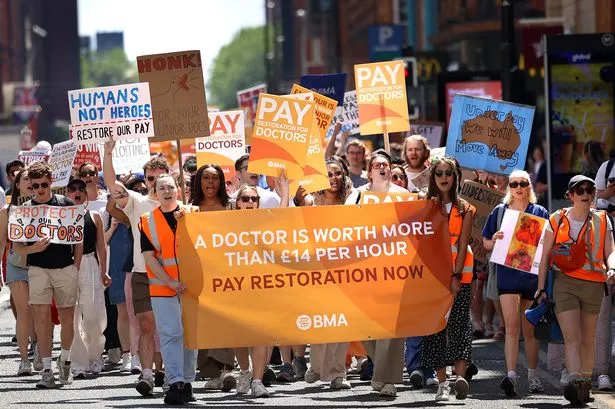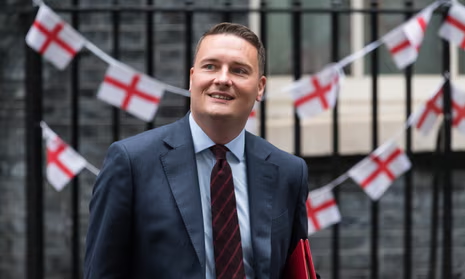
Since December 2022, medical professionals have gone on strike eleven times in order to demand a wage increase of 35 percent.
In an effort to put an end to strike action, the government of England has proposed a salary increase of 22.3% for junior doctors.
The junior physicians committee of the British Medical Association (BMA) has agreed to present the offer to its members, and if it is accepted, it will put an end to the wage-related walkouts that have been going on for several months.
The Times has reported that the wage increase offer will take effect over a two-year period.
A wage increase of between 8.1% and 10.3% is included in this agreement, in addition to a backdated raise of 4.05% for the fiscal year 2023–24.
Moreover, this is in addition to a 6% pay increase for the year 2024-2025, which will be supplemented by a payment of £1,000, which is equivalent to a pay increase of between 7% and 9%.
Chancellor Rachel Reeves made a huge announcement this afternoon regarding spending cutbacks in order to fill what she referred to as a “£20 billion black hole” that was inherited from the Conservative government. She made the announcement to reveal an offer.
Junior doctors have been advocating for a wage boost of 35 percent in order to compensate for what they claim to be 15 years of salary increases that have been lower than inflation.
“Industrial action in the NHS alone cost the taxpayer £1.7 billion last year,” Reeves said for the members of parliament.
“That is why I am pleased to announce today that the government has agreed to an offer to the junior doctors, which the BMA is recommending to their members.”
The National Health Service (NHS) in England has lost an estimated £3 billion as a result of the cancellation of procedures and appointments due to the strike action.






The chief economic consultant to the Centre for Economic and Business Research, Vicky Pryce, stated that the government “probably can” afford a pay raise of 22.3% for junior doctors because it is lower than the 35% increase that junior doctors have been demanding, which was expected to cost between £1 billion and $2 billion.
“If you look at the cost to the NHS and basically to taxpayers on all those appointments that didn’t happen since December 2022, that has been added up to around £3bn anyway,” she explained to reporters.
As a result, we are in a far better position to pay than to have anything comparable, which will sort of continue over the course of the next year or two. And so, yeah, we are able to afford it.
It was of the utmost importance to the newly elected health secretary that the disagreement between the young doctors be resolved.
To put an end to more than 18 months of damaging strike action, it appears that it has only taken Wes Streeting three weeks to bring an end to the situation.
If the government were to make any headway on Labour’s pre-election health objectives, specifically reducing the elective backlog, he was the one who needed to make this correction work.
During the strike that junior doctors are now participating in, it is difficult to make any progress on the waiting list.
In order to cut down on the number of individuals who are waiting to be seen, Mr. Streeting has stated that he intends to schedule an additional 40,000 appointments each week. In addition, he stated that he would be able to deliver these using the personnel that was already in place.
He requires the assistance of his junior doctors in order to achieve this goal. The employees in the healthcare industry have an exceedingly limited supply of goodwill.
They are worn out from working through the pandemic and then a series of winter crises that have occurred in succession.
By demonstrating that it appreciates its junior doctors, the government has demonstrated that it is willing to move toward wage restoration.
The hemorrhaging of educated doctors leaving the National Health Service (NHS) for more lucrative work elsewhere will be addressed as a result of this.

In spite of the fact that the National Health Service (NHS) has been forced to spend billions of pounds in order to cover the strikes, critics will argue that the government has given in to the demands of a militant union at a time when the government is least able to pay it.
However, the long-term cost of suffering for patients who become sicker while waiting for regularly cancelled surgeries is more difficult to estimate. This cost is real and physical, but it is difficult to quantify the long-term cost.
After the independent arbitration that junior physicians had agreed would take place in May with the previous government was rejected when the vote was called, junior doctors went on strike for the last time on July 4th related to the election.
Last year, the British Medical Association (BMA) withdrew from negotiations with the Conservative administration, during which they had discussed an additional 3% pay raise in addition to an average 9% increase for 2022–23.
A junior doctor is any doctor who is not a consultant, and they make up about half of the medical staff in the National Health Service (NHS).